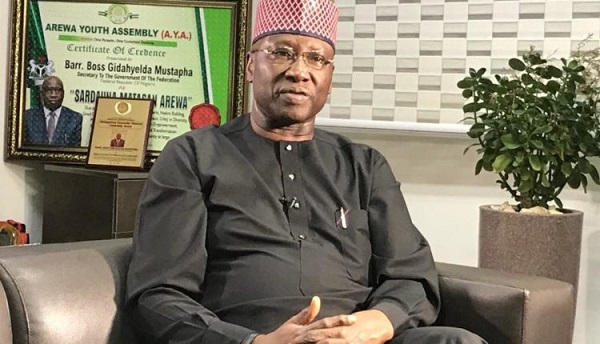The Secretary to the Government of the Federation, Boss Mustapha has revealed that the Federal government shall very shortly unveil mandatory vaccination for every public service employee.
This, according to him, will be made possible as the Federal Government increase supplying vaccine.
While adding that, It is important that we also fine-tune the polices when the President and the Vice President took the vaccine it became mandatory for ordinary citizens to follow suit.
He gave this revelation while declaring open a Two Day quarterly meeting with the theme: “Building a stronger health sector in Nigeria through collaboration and strategic partnership” organized by Nigeria Health Commissioners Forum (NHCF) on Thursday in Abuja.
He said, “Research and science have played their parts in taking the battle against the virus to the vaccines stage. Global vaccine nationalism is still ragging but we have succeeded in accessing millions of doses of vaccines through partnership and diplomatic efforts.”
“The acquisition of sufficient doses that will enable us vaccinate 70% of our population is in progress. As at date over 4 to 6 million Nigerians have-been vaccinated fully have received the first dose. Only recently the second round of vaccination was launched.”
“You should in the course of this meeting, deliberate on the challenges caused by vaccine hesitancy all over the country. It is expected that you will come with policy alternatives as solutions. Let me state however, that Federal Government shall, very shortly unveil its decision on mandatory vaccination for every employee in its service.”
“Am happy to note that this meeting will be discussing broader health issues such as (i) the Basic Health Care Provision Fund; (ii) strengthening Primary Health Care; (iii) HIV/AIDS control with its multisectoral consequence; (iv) Universal Health Coverage; (v) Health Insurance, as well as various high impact interventions being implemented either directly or with our development partners.”
It is my expectation that all those identified challenges hindering smooth implementation of partnership support at the subnational level would be outlined and measures to address them articulated and agreed upon by the end of this meeting.
Similarly, the Minister of State for Health, Sen. Olorunnibe Mamora said there is donor fatigue , all over the place it is difficult to get free fund. We are currently working with the finance ministry on how to galvanise domestic resources to financing health through pro-health taxes.
There are currently plans to institute a frame work for financial sustainability for HIV, TB, Malaria and entire health system. All this is jeered towards Universal Health Coverage for all Nigerians.
He added that, the leadership of the Federal Ministry of Health from will continue to provide the required stewardship with drive tailored towards providing enabling environment that will guarantee sustainable financing for health and as well strengthen the system for essentials service.
“We need to begin to tax commodities like alcohol, cigarettes, etc., which causes a lot of damage to the human body; therefore, the where the whole thing will end is in the health sector, therefore increasing the spending in the health sector. That is why we are saying that if people take these things, let us find a way to put some tax on it so that we can get some money to fund the health sector in addition to existing funding structures.”
More so, the Minister of State for Finance, Budget and National Planning, Prince Clement Abba said his ministry will support states to enable them benefit maximally from the donor agencies.
He also hinted that, Health commissioners should work collaboratively their counterparts in the ministry of Finance, Budget and National planning for effective coordination of the activities to promote unity, avoid duplication of activities and ensure efficiency and accountability.
Similarly, the Director in General, Nigeria Governors Forum (NGF) Secretariat, Asishana Okauru Esq said as part of their commitment, health has become a permanent agenda at the monthly meetings of the NGF where Governors are updated on priority health issues, utilizing advocacy tools such as scorecards and state-specific briefs. These updates amongst other achievements helped maintain Governors’ commitment to Polio eradication efforts which subsequently led to Nigeria being declared polio-free in 2020.
Similarly, we have seen a phenomenal rise in the number of states with State Health Insurance Agencies, a development that we are proud to attribute to the strategic advocacy that we have employed.
We have also seen progress in the implementation of the Primary Healthcare Under One Roof Policy as all states now have State Primary Healthcare Boards. Governors have also committed to further strengthening Primary Health Care System through their Seattle Declaration. More recently, the Health team of the Secretariat has has anchored the subnational coordination of the COVID-19 pandemic response, which has been critical in fostering a single national COVID-19 pandemic response.
The Secretariat has also been working on health financing, which is a major challenge to the sustainability of health interventions. The Secretariat is therefore conceptualizing a Tax for Service model as a mechanism for handling the health financing issues at the subnational level. We hope to invite the Commissioners of Health to a Peer Learning Event in a few weeks where this will be discussed extensively.
Meanwhile, the Chairman, Nigeria Health and Commissioners Forum and Commissioner of Health foe Cross River State, Dr. Betta Edu said the meeting is to discuss a way forward in the health sector at the state level, saying, no matter how beautiful the policies of the national looks, it will not see reduction in maternal mortality, Under 5 deaths, pandemic if the states are not strengthened.
She added that, they intend to work with the federal government, development partners to improve health financing in our states.
We have alot of fragmentation from the national, all the way down to states and it’s affecting the system there are duplication , wastage and leakages of issues without implementation. We want to bridge all the various gap and at the same time decentralize from the federal government down to our states.
By Toyin Adebayo,
The Independent



